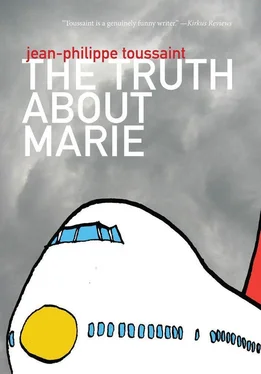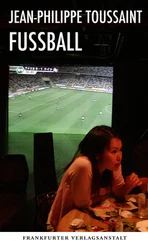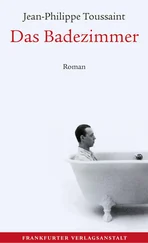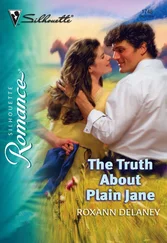Marie spent the summer alone at La Rivercina. Occasionally, in the early evening, returning from the beach, she’d wash her hair in the small garden, standing against the gate in her bathing suit, her bare feet in the soil or planted on a blue duckboard, her hair lathered with a soapy white foam whose vanilla scent seemed to hang in the air around her, and she ran her hands through her hair under the hose’s spray of warm water. She’d bend down to turn off the water and roll her hair up in a big white towel, after having let it drip at length, her head hanging upside down above the ground. She’d return to the house, her flip-flops slipping off her feet, barely attached, sliding on the ground and scraping against the terrace’s large, irregular flagstones. She’d lower the straps of her bathing suit one at a time, slide it down her hips and leave it carelessly on the kitchen floor, proceeding up the stairs naked, turbaned in white, her flip-flops clacking, daisies between her toes, her naked body pearled with beads of water glistening in the sun and trickling off her at each step.
Before leaving La Rivercina the previous year, Marie had boarded her father’s horses at the equestrian club of La Guardia. When her father was still alive, Peppino, the manager of the club, would see to the horses’ health, coming by La Rivercina at least once a month to check on them, inspect their coats, examine their teeth. Old Maurizio was happy to make sure the horses had water, and Marie’s father would give them a treat sometimes by bringing them an extra share of hay or a bucket of oats. He’d cross the paddock’s fence and walk up to the horses with his bucket, addressing them cheerfully from a distance ( ciao, ragazzi , he’d say to them, and he’d pet their necks affectionately with the flat of his hand, and they’d snort and shake, sending swarms of flies away in the dust of the paddock).
Marie had taken a liking to Nocciola, the mare with beautiful eyes that she’d ridden for the first time the previous year, the day of her father’s funeral, when she’d escorted his hearse on horseback through the streets of Elba all the way to the cemetery. This year she’d gone to see Nocciola at the equestrian club at the beginning of July, and she’d wanted to ride her. She rode her at a slow pace, gently going around the riding stable, under the passive surveillance of Peppino’s daughter, a glum adolescent straddling the fence, a telefonino at her ear, speaking with a lilt that she punctuated at times with a brief salvo of eloquent gestures made with an upturned hand. The equestrian club comprised a scattered set of stone cottages spread around a sort of clearing, at one end of which lay a dusty track with a single building for the lounge and reception, a shed for the saddles and various harnesses, as well as simple stables with sheet metal roofs and wooden frames, reinforced with planks, where the horses spent the night. From outside the stalls, the dark manes of the horses could be seen waving in the air, while their legs were still under the stable doors, as though their upper and lower halves belonged to different animals. The riding stable felt at once closed and opened, surrounded as it was by white barriers and at the same time leading directly into the coastal scrub. On horseback, one’s view stretched far into the surrounding countryside, past the wild olive trees, all the way to the hill’s barren crest, where wind and successive fires had consumed most of its vegetation. It wasn’t long before Marie needed no help riding Nocciola, she saddled the mare herself when she arrived at the club, leading her by the bridle, mounting the saddle, and riding around the paddock at a slow pace, then, firmly kicking the horse’s sides, riding at a trot, and, after a week, at a gallop.
One morning, at the end of August, Marie, casting aside the old clothes she wore for riding or gardening, did herself up, she’d put on makeup in front of the mirror. Before leaving her room, she carefully applied her lipstick, which she softened by pressing her lips to the soft center of a toilet paper roll, leaving the silent vestige of a red kiss on the roll as she placed it back down on the marble counter. Marie left the property in her father’s old open-bed truck, and she drove serenely through the winding roads of Elba, the sea below her, blue, still, with warm air blowing through the truck’s open windows. Next to her, on the seat, sat a bouquet of wild flowers she’d arranged the night before in the kitchen, with a sense of refinement she demonstrated time and again when dealing with colors and fabrics, never forcing novelty or originality, just a small gesture, simple, confident, natural, bringing together, in a vase, the obvious and the impossible, three sprigs of fennel culled on the side of the road, two branches of a young eucalyptus taken from a tree in the garden, and a few clippings of bougainvillea with royal purple flowers she’d stolen from the terrace of a seaside residence.
Before arriving at Portoferraio, Marie had turned onto a small winding road that led to the cemetery where her father was buried. Once there, standing motionless, she bowed her head in silence a moment in front of his grave. She placed the bouquet of wild flowers on his grave and left without looking back, she returned to the car and took off without delay toward Portoferraio. She’d driven into the city proper and continued all the way to the port, blankly staring out the smudged windshield, its surface covered in a thick layer of dirt and resin from the pine tree under which the old truck had spent the winter. Marie drove along the quays slowly and parked the car by the harbormaster’s office. She got out and left the port on foot to go have an espresso at the counter of one of the many cafés on the esplanade by the docks. She sipped her espresso calmly, it was almost noon, she was in her full splendor, wearing white pants and a slightly faded parma pink shirt, and she watched the ships drift in and out of the port. After about twenty minutes, a boat coming from Piombino came into the port, and I was there, on the deck of the boat.
It was my first time in Elba since the previous summer, almost a year to the day since Marie’s father’s death. I took the same Toremar boat I’d taken the previous year, when I’d come back from China to attend her father’s funeral. As soon as the boat set sail, I took refuge in one of the cabins on the lower deck, and I sat lost in thought in the hot, dark shade of a stiff seat with metal armrests. I ended up falling asleep, dozing in the half-light, soothed by the hum of the motor, details from the night of Jean-Christophe de G.’s death filling my mind, without my trying consciously to put them together into any particular order. No, I settled only on snatches of that night in my half-sleep, making some vague conjectures — hypotheses and projected images — calling on different areas of my brain, having recourse to reason when developing hypotheses or evoking corresponding images from dreams. To a few confirmed and proven facts from that night, I added my own fantasies, mixing them together liberally in my mind, linking imaginary acts to real places in my half-sleep, mentally walking around the apartment on rue de la Vrillière, where I’d spent more than five years with Marie, moving in and out of rooms, opening the window and finding the gate around the Banque de France, Parisian streetlamps infusing the whole scene with a yellow light, while at the present moment I was sitting snugly on a boat silently crossing calm seas between the coast of Italy and the shores of Elba.
I knew that night contained its own objective reality — what had really taken place in the apartment on rue de la Vrillière — but that reality would always be out of my grasp, I could only circle it, approach it from different angles, go around it and attack it from the side, but I’d always come up short, as though what had actually happened that night was fundamentally unattainable to me, out of my imagination’s reach and irreducible to language. I could reconstruct that night in mental images with the precision of dreams, I could cover it in words with a formidable power of evocation, all in vain, I knew I’d never reach what had been the fleeting life of the night itself, but it seemed to me that I could perhaps reach a new truth, one that would take its inspiration from life and then transcend it, without concern for verisimilitude or veracity, its only aim the quintessence of the real, its tender core, pulsing and vibrant, a truth close to invention, the twin of fabrication, the ideal truth.
Читать дальше












